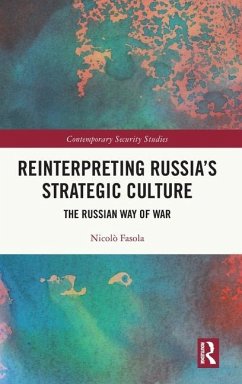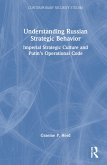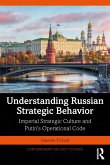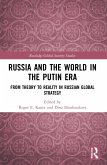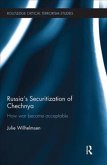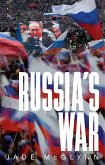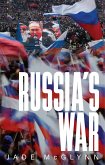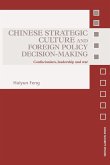This book analyses the categories of thought underpinning Russia's strategic decision-making and military operations, unpacking their nature, development, and interaction.
The work argues that mainstream Western analysis of Russian military and strategic behaviour is affected by two limitations: first, by forcing Russian choices into pre-packaged logics of action, it fails to grasp the peculiar assumptions and intellectual nuances underpinning Moscow's strategies; second, an overreliance on buzzwords such as 'hybridity' has mystified understanding of the Russian military modus operandi, its true character and strong consistencies. The book addresses such limitations by stressing the influence of strategic culture on Russia's approach to strategy and war-fighting. After proposing an original model of strategic culture, it employs this conceptual framework to interrogate Russian primary sources and military practices between 2008 and 2018. This allows general hypothesesto be formulated about the ultimate principles underpinning the Russian way of war, which are then tested against three case studies: Russia's interventions in Georgia (2008), Ukraine (2014-2015), and Syria (2015-2018), respectively. While steering clear of making forecasts, this book provides a solid basis on which to build expectations about and to chart strategies for counter-acting Moscow's actions- including in the context of the current war in Ukraine.
This book will be of much interest to students of Russian security, military and strategic studies, foreign policy, and International Relations in general.
The work argues that mainstream Western analysis of Russian military and strategic behaviour is affected by two limitations: first, by forcing Russian choices into pre-packaged logics of action, it fails to grasp the peculiar assumptions and intellectual nuances underpinning Moscow's strategies; second, an overreliance on buzzwords such as 'hybridity' has mystified understanding of the Russian military modus operandi, its true character and strong consistencies. The book addresses such limitations by stressing the influence of strategic culture on Russia's approach to strategy and war-fighting. After proposing an original model of strategic culture, it employs this conceptual framework to interrogate Russian primary sources and military practices between 2008 and 2018. This allows general hypothesesto be formulated about the ultimate principles underpinning the Russian way of war, which are then tested against three case studies: Russia's interventions in Georgia (2008), Ukraine (2014-2015), and Syria (2015-2018), respectively. While steering clear of making forecasts, this book provides a solid basis on which to build expectations about and to chart strategies for counter-acting Moscow's actions- including in the context of the current war in Ukraine.
This book will be of much interest to students of Russian security, military and strategic studies, foreign policy, and International Relations in general.
'This is an outstanding and timely book. The author offers original and distinctive insights, based on extensive research into sociology, political theory and military affairs. By leveraging an innovative approach, Fasola goes beyond standard interpretations to emphasise the fundamental role of ideational factors in understanding Russian strategy and security policy.'
Derek Averre, University of Birmingham, UK
'This excellent new book makes a valuable contribution to our understanding of the Russian way of war. Extensively researched, it explores the beliefs that underpin Russia's strategic and military choices, focusing on the decision to use force in Georgia, Ukraine and Syria. Essential reading for those seeking to understand how and why Russia has used military force in the 21st century.'
Tracey German, King's College London, UK
'This book is a timely and important contribution to scholarship on Russian military thinking and the role of non-material factors in Russia's foreign relations. Fasola combines both empirical precision with real-world application to the events that shape Moscow's perceptions and motivations.'
Marc Ozawa, NATO Defence College, Rome, Italy
'This book is an invitation to a serious and highly nuanced talk about the fundamental fulcrum of Russian foreign policy - its strategic culture. It perfectly illustrates how Russian decision-makers' perceptions of themselves and the world, their 'operational code', shape official discourse and policies.'
Igor Gretskiy, International Centre for Defence and Security, Estonia
Derek Averre, University of Birmingham, UK
'This excellent new book makes a valuable contribution to our understanding of the Russian way of war. Extensively researched, it explores the beliefs that underpin Russia's strategic and military choices, focusing on the decision to use force in Georgia, Ukraine and Syria. Essential reading for those seeking to understand how and why Russia has used military force in the 21st century.'
Tracey German, King's College London, UK
'This book is a timely and important contribution to scholarship on Russian military thinking and the role of non-material factors in Russia's foreign relations. Fasola combines both empirical precision with real-world application to the events that shape Moscow's perceptions and motivations.'
Marc Ozawa, NATO Defence College, Rome, Italy
'This book is an invitation to a serious and highly nuanced talk about the fundamental fulcrum of Russian foreign policy - its strategic culture. It perfectly illustrates how Russian decision-makers' perceptions of themselves and the world, their 'operational code', shape official discourse and policies.'
Igor Gretskiy, International Centre for Defence and Security, Estonia

